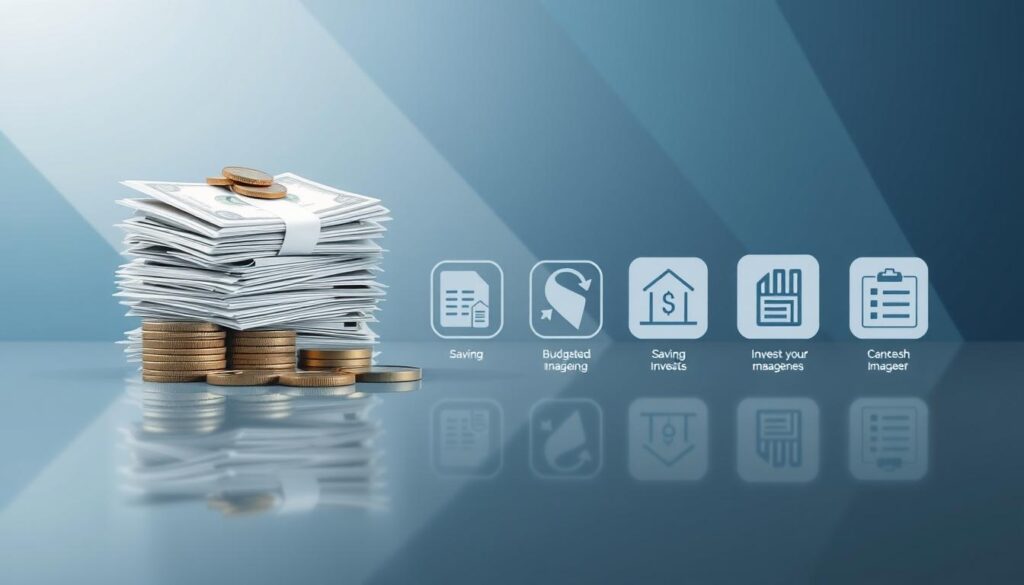Financial literacy is crucial for making smart money decisions. It involves budgeting, saving, and investing wisely. These skills lead to a secure financial future.
Understanding financial education helps people manage their money better. Starting early improves success in reaching long-term goals. Luckily, free resources like MyMoney.gov are there to help.
Anúncios
Understanding Financial Literacy
Financial literacy is about knowing how to handle money matters. It involves budgeting, managing expenses, and making smart investment choices. With more financial products available, learning about money is key. This knowledge helps people make wise choices about saving, spending, and borrowing.
Definition and Importance
Being financially literate means understanding how to manage your money well. It helps you avoid too much debt and scams. You learn to budget and save for big goals like retirement or college. This knowledge is good for you and the economy.
Key Takeaways for Effective Money Management
Here are important points about learning to manage money:
- Develop budgeting skills to manage daily expenses better.
- Learn the difference between wants and needs to spend wisely.
- Set savings goals for future needs.
- Know how investing can grow your wealth over time.

The Dangers of Financial Illiteracy
Financial illiteracy brings big challenges. It doesn’t just affect personal money matters. It also touches on credit scores, job chances, and how happy people feel in life. Not knowing enough about finances leads to serious errors. These can cause too much debt and not enough savings for later.
Consequences of Poor Financial Knowledge
People who don’t understand finances face tough problems. They struggle to handle their money well. This struggle can lead to:
- Low credit scores, making it hard to borrow in the future
- A bigger chance of going bankrupt from spending too much
- The risk of losing their home if they can’t pay their bills
This shows why learning about finances is so critical. Many people aren’t ready for retirement because they don’t know enough about managing money.
The Risks of Unsustainable Debt
Bad financial decisions often lead to too much debt. This happens when people use credit cards with high interest without realizing it. It’s tough to break free from this debt cycle. Some common dangers are:
- Using credit cards for daily buys
- Not paying on time, which means more fees
- Feeling stressed and anxious about money all the time
The world of finances is getting more complex. People who don’t know much about it face more risks. To manage money well, they need to learn and plan ahead, especially to avoid debt traps.
Scope of Financial Literacy
Financial literacy covers many key skills needed for everyday life. It helps people handle their financial challenges better. Budgeting, managing debt, and evaluating financial options are some of these important areas.
Essential Skills for Everyday Life
It’s very important to have good financial skills to stay stable. These skills include:
- Creating and sticking to a budget
- Understanding compound interest
- Knowing the value of money over time
- Choosing the right financial products
By learning these skills, people can make better choices for now and the future.
Long-Term Financial Strategies
Planning for the future financially is key to achieving goals and being secure. Good strategies are:
- Saving for retirement early
- Investing smartly to grow savings
- Building an emergency fund for unexpected costs
- Keeping debt under control
Using these strategies helps people not just survive but thrive financially.
Why Financial Literacy Matters
Financial literacy is key for managing money well. It helps people handle daily costs, make smart loan choices, and plan ahead. This knowledge is vital to avoid the traps of bad finance decisions. Many people, especially millennials, face big money hurdles.
Supporting Financial Well-Being
Learning about finances helps people make wise choices with their money. It teaches budgeting, saving, and investing skills. These skills help secure a stable financial future.
Without this knowledge, it’s easy to fall into debt or miss chances to grow financially.
Challenges Faced by Different Generations
Different age groups face different money challenges. Millennials, for example, deal with huge student loans and expensive living costs. Financial knowledge can give them the tools to handle their money better.
By teaching financial skills, we can help everyone achieve a steady money situation in the future.
Benefits of Financial Literacy
Learning about finances changes how people handle money. It helps them make smart choices with confidence. They learn to avoid mistakes, like bad loan management or early retirement fund withdrawals. This knowledge helps them deal with money problems better.
Empowerment through Knowledge
Improving financial literacy brings many benefits. It empowers people by giving them control over their finances. They understand money matters better and can make smart plans for their goals.
Building Confidence in Financial Decisions
Knowing about finances makes people more sure of their choices. People who understand financial basics can better deal with unexpected issues, like a job loss. They learn to budget, save, and invest wisely. This confidence supports a healthy financial life forever.
Strategies to Improve Financial Literacy Skills
Learning how to manage money is key for long-term financial well-being. Having a good budgeting strategy is central to keeping track of income and expenses. By setting up a budget, you get a clear picture of your finances. This helps you make wise spending decisions. Budgeting tools, like apps or spreadsheets, can make it easier to stick to your financial plans.
Create and Stick to a Budget
When you make a budget, you’ll look at your income and necessary expenses. A solid budget shines a spotlight on where your money goes. It allows you to tweak your spending as needed. To get your budget on track:
- Identify your regular and changing expenses every month.
- Decide how much you can spend on fun or extra things.
- Keep checking your budget and update it if things change.
Pay Yourself First for Savings
Putting money into savings is crucial for financial smarts. The idea of “pay yourself first” means saving a bit of your income before paying other bills. This method helps you save regularly and grow your savings over time. To do this well:
- Set up automatic money transfers to your savings account.
- Have clear goals for what you’re saving for.
- Check often to see how close you are to your savings goals.
Managing and Reducing Debt Effectively
Knowing how to handle and lower your debt is important for your finances. Start by focusing on debts with high interest rates to save on interest costs. Here are ways to manage and cut down your debt:
- Make a plan to pay off debts, starting with the highest interest rates.
- Look into combining your debts into one if it helps.
- If needed, get advice from a financial expert.
Popular Personal Budgeting Methods
Effective budgeting is key for reaching financial stability. The 50/20/30 rule and the 70/20/10 rule are easy ways to manage money. They fit many different financial needs and likes.
Understanding the 50/20/30 Rule
The 50/20/30 rule makes budgeting simple. Split your after-tax income into three parts:
- 50% for necessities like housing, utilities, and food.
- 20% for saving and paying off debt.
- 30% for things you enjoy, such as movies and dining out.
This strategy focuses on covering vital costs, saving, and spending on fun activities well.
Exploring the 70/20/10 Budgeting Rule
The 70/20/10 rule provides a different way to organize spending:
- 70% for all usual expenses.
- 20% for savings or reducing debt.
- 10% for investments or giving to charity.
It allows for flexible spending but still promotes saving and helping others. It suits various people.
Example of Financial Literacy in Action
Teaching financial literacy in schools is a great way to show it in action. Students learn vital skills like budgeting, handling debt, and saving. These skills help young adults manage their money with confidence.
Practical Applications of Financial Literacy
Financial literacy lessons give students the tools to make smart money decisions. They learn about:
- Using a budget to keep track of spending
- Responsible use of credit cards
- How to save money effectively
- Planning for big costs like college and retirement
This education helps them understand their finances and take control as they become adults.
Case Study: Emma’s Classroom Initiatives
Emma, a financial educator, brings financial literacy to life for her students. She uses real-life simulations to teach them practical money management. Her students take part in:
- Mock budgeting to learn about financial planning
- Debt management games to learn about credit
- Saving and investing workshops for beginners
Thanks to Emma, her students are well-prepared to face real money issues. They become smart about finances.
Conclusion
Financial education is very important. It lays the groundwork for financial freedom and security. Knowing how to handle money can improve one’s life immensely.
Learning about finances helps people deal with money matters with confidence. They can learn how to manage their finances better by seeking out information. This knowledge can have a positive effect for years to come.
Getting better at managing finances is all about learning and staying aware. When people understand more about money, they make smarter choices. This leads to achieving their money goals and planning better for the future.
FAQ
What is financial literacy?
Why is financial literacy important?
How can I improve my financial literacy?
What are the consequences of financial illiteracy?
What budgeting methods are useful for managing finances?
How can students learn about financial literacy?
What are the core components of financial literacy?
How can understanding compound interest help me financially?
Conteúdo criado com auxílio de Inteligência Artificial



